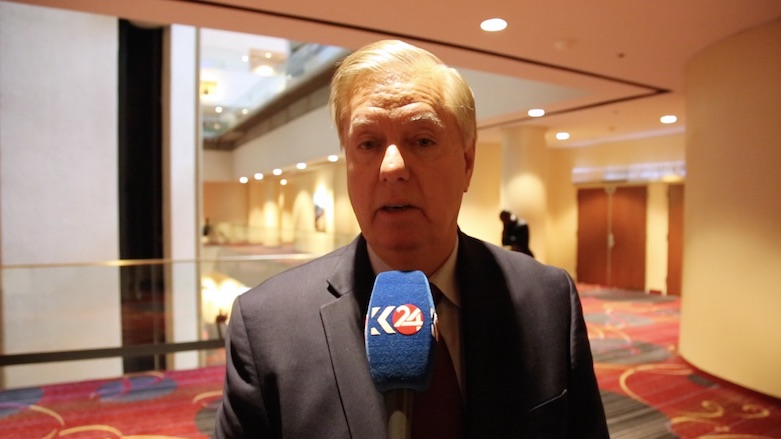Sen. Lindsey Graham: US lacks policy against Iran in Syria

WASHINGTON DC (Kurdistan 24) – Sen. Lindsey Graham (R, South Carolina) cautioned that the US has no “policy for countering the Iranians in Syria.”
Speaking to Kurdistan 24 at a conference sponsored by The Jerusalem Post in New York over the weekend, Graham said that Iran, along with Russia and Syria, “are dominating the battlefield.”
If the US is not careful, Syria will “become the new Lebanon,” the Senator, who sits on the Senate Armed Service Committee, warned, and Syria will become an armed camp for Iran and Hezbollah.”
Iran’s presence in Syria is also a very big worry for Israel. On Sunday, Israeli planes bombed airbases in Syria, including in the western city of Hama, where they targeted weapons recently delivered by Iran.
The Israeli attack, along with the exploding munitions, triggered a small—2.6 magnitude—earthquake, and some two dozen Iranian soldiers, including officers, were killed, NBC News reported.
“You cannot give Damascus to the Iranians,” Graham warned. “They will have a land bridge from Tehran to Beirut, which is a nightmare for us and Israel.”
Graham outlined a far more muscular policy for the US than Washington has so far been willing to consider, whether under former President Barack Obama or under President Donald Trump.
“I’m trying to encourage the President to create no-fly zones, so Syrians can come back to their own country,” Graham explained.
“Regional armies, with our help, can train Syrians to take [Bashar] al-Assad on,” and “Russia will eventually get tired of supporting Assad.” The strategic objective, Graham suggested, would be to separate Russia from Iran.
Jennifer Cafarella, Senior Intelligence Planner at the Institute for the Study of War, however, suggested at a Hudson Institute seminar last week, that separating Tehran and Moscow might not be so easy.
“The Russians and Iranians are in a coalition,” she said, which “extends far beyond the Syrian battle space.”
“They share common interests,” she affirmed, and one key shared interest “is constraining the US and ideally kicking us out of the region.”
Trump has repeatedly stated his desire to withdraw US troops from the area of Syria that they now hold, along with their partner force, the Kurdish-led Syrian Democratic Forces, east of the Euphrates River. However, he also wants to block Iran’s expansion.
In a state visit last week, French President Emmanuel Macron, who has also sent troops to Syria, seemed to persuade Trump of the importance of avoiding a precipitous withdrawal.
Most recently, on Tuesday, State Department Spokesperson Heather Nauert issued a statement that seemed to reflect a stronger US commitment in Syria.
“As the President said in remarks with President Emmanuel Macron of France,” Nauert’s statement read, “we will ensure that there is a strong and lasting footprint in Syria such that ISIS cannot return” and that those Syrians “liberated from ISIS are not exploited by the Assad regime or its Iranian supporters.”
